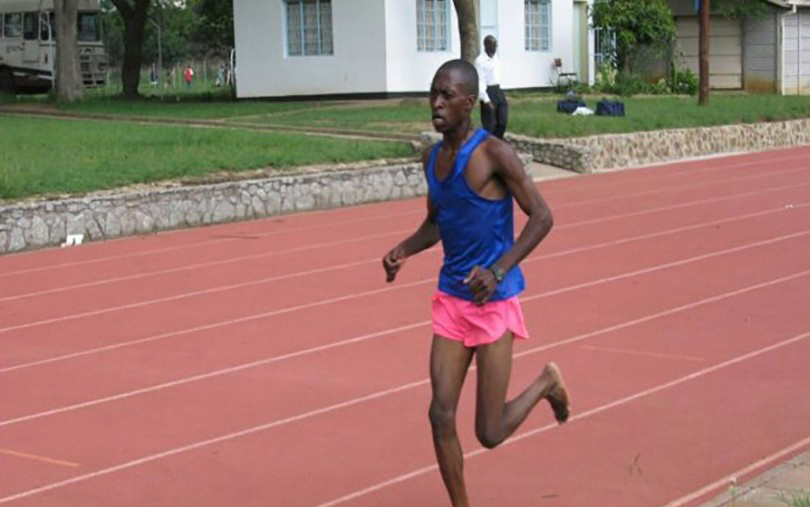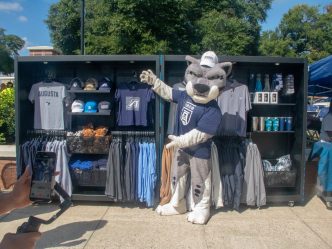UPDATE: Augusta University is home to an impressive number of amazing people, but few have come as far – or have the potential to go as far – as assistant coach and MBA recipient Pardon Ndhlovu, who began his journey running barefoot in Zimbabwe and has now officially qualified to run for Zimbabwe in this year’s Summer Olympics in Rio.
This story posted to Jagwire in December, 2015, as Ndhlovu was training for the Houston Marathon.
Every morning, Pardon Ndhlovu rises with the sun, his constant running partner.
Rolling out of bed, he pulls on his shorts, laces up his running shoes and drives to the Augusta Canal.
For more than hour, he will run alongside the river, feet pounding gravel. He smiles and nods in acknowledgement to the other runners. He might focus on training his mind to endure the physical pain of running. Some days, he meditates, others he sings.
Regardless of what else he does to pass the time, though, he always runs.
Every day. At least one hour. Rain or shine.
Ndhlovu, an assistant coach and graduate student in the Hull College of Business, is an elite distance runner training for the 2016 Summer Olympics in Rio de Janeiro. For now he has a spot on the Zimbabwe men’s marathon team. In January, he will compete at the Houston Marathon in hopes of cementing this spot.
For more than 10 years, Ndhlovu’s days have started, and sometimes ended, with a run. In the last decade, this daily routine has rarely changed, with one exception.
Today, Ndhlovu wears shoes.
Born in Harare, Zimbabwe, Ndhlovu began running at the age of 14 when his father told him, and his twin brother, that they needed to find a sport.
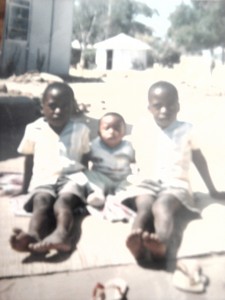
Running wasn’t expensive. All they needed was a pair of shorts and a T-shirt. Shoes were optional.
Ndhlovu’s father suggested the boys join the police team. After all, he was friends with the coach.
“We were like, yeah, okay, we’ll try it out,” Ndhlovu remembers.
It was the police team that introduced Ndhlovu to running longer distances. There, he ran his first half-marathon. The race remains one of his strongest memories.
The team had to drive four hours to compete in this particular race. Ndhlovu arrived expecting to run the 5K. He was in for a surprise.
When the team arrived, race officials announced the 5K was for runners aged 10 or younger. Fifteen at the time, Ndhlovu was told he would not be allowed to participate.
His coach gathered the team and explained that if the 5K runners wanted to compete, their only option was the half-marathon. Every runner opted to sit the race out. Every runner except Ndhlovu.
“That was that most painful race I’ve ever run in my life,” Ndhlovu recalls. “I finished it. I don’t remember the time, but I finished it.”
After the race, Ndhlovu could not walk. His teammates had to help dress him, and he slept the entire four-hour drive home. However, there’s a reason this particular race continues to resonate with him more than a decade later.
“It was painful, but at the same time I wasn’t running for time,” he says. “It was to see how far I could go. That was the start of my marathon career. At least now, I can always walk after crossing the finish line.”
Beginnings
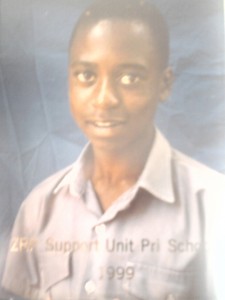
By the time Ndhlovu reached form one, the equivalent to freshman year of high school, he was regularly beating seniors. These small victories motived Ndhlovu to train harder. By the time he graduated from high school, which takes six years in Zimbabwe, Ndhlovu was traveling to countries like Botswana and Namibia to represent his country at junior championships.
It was at one of these competitions that the idea of traveling to the United States to receive a college education first took root.
In 2004, Ndhlovu was competing at junior championships and struck up a conversation with another young man, also from Zimbabwe. The man was a college football player who had recently graduated college and returned to Zimbabwe from the U.S. He mentioned that if Ndhlovu was talented and worked hard, he could go to school in the U.S. on an athletic scholarship.
“I wanted to get out of Zimbabwe and create an opportunity to provide a better life for myself and my family,” Ndhlovu said. “Running was a doorway to open up opportunity.”
Two years later, Ndhlovu graduated from high school. He decided to pursue getting an education in the U.S.
There were several obstacles standing in the way of this goal.
The first hurdle to jump was doing well on the SAT. Ndhlovu grew up accustomed to British English and the metric system. He spent hours studying for the test and hours trying to understand the material he was being tested on. Doing well on the SAT, he realized, would mean relearning everything he thought he knew.
Before he could even reach that hurdle, however, he had to actually take the SAT. In Zimbabwe, test fees averaged $200. In a country where the average daily wage, in 2014, was $6, this was an extravagant sum of money. Ndhlovu took the SAT five times until he received a satisfactory score. In all, his family spent more than $1,000 on SAT testing.
“My parents borrowed money,” Ndhlovu said. “They sold whatever they could sell in the house, and each time I took the SATs, my family went without. To this day, it touches me how every family member made this sacrifice for me.”
The goal was to attend a Division I school. He already knew he had the athletic credentials. At the age of 16, Ndhlovu ran a 14:40 5K, but academics remained a problem. Even the GPA conversion scale from Zimbabwe to the U.S. wasn’t in Ndhlovu’s favor.
Still, he continued to apply to schools, although he wasn’t receiving the responses he hoped for.
“I was looking for a full scholarship because that’s the only way I could afford school,” Ndhlovu said. “Coming to America is every African kid’s dream, especially every child who wants a college education.”
Finally, Ndhlovu got the response he was looking for: a full scholarship to run cross country and track and field from a Division I university.
It seemed too good to be true…and it was.
The NCAA, the regulatory body that governs college athletics, would not clear Ndhlovu. His SAT scores were too low. The only alternative was to retake the test.
Again.
Frustration set in. His training slowed. Ndhlovu couldn’t run a 5K faster than 15:30. He was progressively getting slower.
“You get to the point where you lose heart and wonder if it’s worth it,” Ndhlovu said. “You think, ‘will I ever make it?’”
On a whim, he decided to try applying to a couple of Division II universities.
Eventually, Ndhlovu was approached by Coach Gary Aycock from the University of North Carolina at Pembroke. Aycock was building a team and was interested in recruiting Ndhlovu.
Ndhlovu filled out an application.
He was accepted.
This was the moment Ndhlovu had been waiting for. It was everything he’d been working toward. He called his parents, crying as he told them the good news.
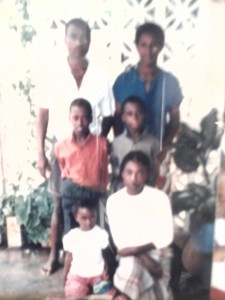
“It was a huge celebration,” Ndhlovu said. “I remember packing my bags. It was the beginning of a life-changing moment.”
In June 2009, three years after graduating high school, Ndhlovu arrived in North Carolina as a college freshman on a full athletic scholarship.
Aycock remembers driving to the airport to pick up Ndhlovu.
“I saw Pardon’s smile and immediately knew it was him,” Aycock said.
They started driving down the interstate to begin the trip back to campus. Ndhlovu was gripping the hand rest, white-knuckled. It was the largest car he had ever been in, and the fastest.
Along the way, the pair stopped to eat Ndhlovu’s first American meal, Taco Bell.
A true runner, the first thing Ndhlovu wanted to see when he arrived at Pembroke was the track. He told his coach about the few times he had the opportunity to run and race on a polyurethane track.
A tour of campus ended in Aycock’s office where Ndhlovu was given his team gear.
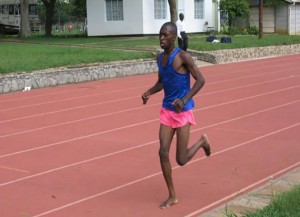
It was then that Ndhlovu received his first pair of running shoes.
“At that point, every day for the first year, my eyes were opened to his culture and the position he was in as an international student athlete,” Aycock said.
Learning how to run in shoes was a tough transition.
“If you asked me to run barefoot now, I couldn’t,” Ndhlovu said. “My feet are too soft, but at home it was a way of life.”
Over the course of the next few days, preseason training started. Ndhlovu had to do a treadmill test. Then, he completed a brief stride workout on the track.
“I knew then that he was going to be one of the best, if not the best, athlete who had ever been at UNC Pembroke,” Aycock said.
As with any move, there was an adjustment period as Ndhlovu got used to living in America. Although, he was told what to expect, Ndhlovu couldn’t help but think that there would be skyscrapers and convertibles everywhere.
“I got to Pembroke and thought, ‘where are the skyscrapers?’” Ndhlovu said.
Then, teammates decided to take Ndhlovu on his first trip to Wal-Mart, where he discovered that he could buy food, electronics and a bicycle, all in one place.
Ndhlovu experienced many firsts at Pembroke.
“You can eat pizza for dinner, which is something I didn’t know you could do,” he said. “I also still don’t understand why we celebrate Halloween.”
Adjusting to life in a new country wasn’t always easy. Talking to family became difficult, and seeing them was impossible. Ndhlovu’s new life was a stark contrast to his life in Zimbabwe.
For example, Zimbabwe cannot afford to provide continuous, state-wide electricity. So, they shut the power off in certain areas while power is turned on in other areas. Friends remember Ndhlovu asking when the lights would go out.
Experiences like these made Ndhlovu long for his family to experience life in America.
“You come to the U.S. and you’ve got running water, you know, and you’ve got food on your table that you don’t have to worry about because on a scholarship, everything’s paid for,” Ndhlovu said. “It was a relief to know that life is better, but at the same time, it was sad because I wanted it for my family.”
Ndhlovu let this desire motivate him.
“I don’t recall him ever giving up or not finishing a workout,” Aycock said. “Often I would stand in awe, more so in practices than in races, because I was constantly watching him run with a stopwatch in my hand. What he can do far exceeds what I’ve ever seen anyone do, in person. This guy is good.”
In his freshman year, Ndhlovu qualified for the national championship in cross country. Likewise, he qualified every year afterwards. By the time Ndhlovu graduated, he was a four-time All American, twice in cross country and twice in track and field. He had become one of the most decorated athletes in UNC Pembroke history.
Olympic Dreams
Like many athletes, Ndhlovu dreamed of one day representing his country at the Olympics. During his collegiate career, he ran both the 5K and 10K races. However, in 2012, one of his coaches, Dr. Jeff Bolles, mentioned he should try the marathon and try to qualify for the Zimbabwe men’s marathon team at the Olympics. Ndhlovu was willing to do whatever it took to maximize his potential.
“It’s important people understand the level of commitment he has,” Bolles said. “It’s incredible.”
In May 2013, Ndhlovu graduated from UNC Pembroke with a degree in international business and a minor in athletic coaching. He was interested in continuing his education, so he applied for the NCAA Post-Graduate Scholarship.
Later that year, Augusta University competed against UNC Pembroke. The meeting gave Ndhlovu a chance to establish relationships with the athletes and head coach, Adam Ward. Ndhlovu talked with Ward about Augusta’s MBA program and the possibility of a graduate assistant coaching position.
The NCAA awarded Ndhlovu with the NCAA Post-graduate Scholarship, and Ward offered him a position as a coach. In August 2013, Ndhlovu began MBA classes as an Augusta student and began working with the cross country team as assistant coach.
Ndhlovu spent a lot of time with Ward. One day while sitting in the office, talking about training, Ndhlovu’s quest for Rio came up.
“I don’t remember if he asked me or if I offered, but I remember saying ‘if you need help with training, I’m happy to help you,’” Ward said. “It’s just one of those things that happened.”
Ward is now coaching Ndhlovu.
In between classes and coaching responsibilities, Ndhlovu devoted his time to marathon training with the goal of qualifying for the 2016 Olympics. Here again, things get complicated.
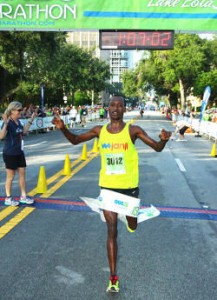
Zimbabwe takes three men to the Olympics as members of the marathon team. The men with the top qualifying times are selected. In January 2015, Ndhlovu ran the Houston Marathon, an Olympic qualifying marathon. He finished with a time of 2:16:51. The time met the qualifying standard of 2:17, securing him a spot on the Olympic men’s marathon team and making his time one of three to beat.
Ndhlovu’s fiancée, Keara Robinson, remembers the race vividly. There was a large crowd, so due to security reasons, this was the first time Robinson was not able to see Ndhlovu both start and finish. It’s cold in January, even in Texas, and Robinson sat on the bleachers shivering. She knew what time Ndhlovu needed to run, down to the individual mile splits. As the qualifying time moved closer, Robinson got more anxious. She started praying silently, trying to send good vibes.
Then she saw Ndhlovu in his bright-green singlet. She looked at the clock and knew he would make the qualifying time. She jumped off the bleachers and started running. There was one thought running through her mind. She had to be there when Ndhlovu crossed the finish line. He made it. He crossed the finish line and earned a spot, however tenuous, on the Zimbabwe men’s marathon team.
Friends and loved ones celebrated from afar. They had followed Ndhlovu’s progress via a live feed.
“This is the culmination of years and years of hard work,” Ward said. “It’s really cool to help someone achieve a goal and a dream they’ve had, in Pardon’s case, forever. He’s put in a ton of hard work and remained very humble and optimistic. He has a heart of gold, he’s honest, almost to a fault, and he’s always going to give you his best. He’s pretty much the same guy to everybody. This couldn’t happen to a better person.”
In the past year, several runners have attempted to qualify for the Olympics, but none have taken Ndhlovu’s spot. The last qualifying marathon is in June 2016.
Next month, Nhdlovu will return to Houston in an effort to solidify his spot on the Olympic team. He is hoping to finish at or under 2:14.
“I know that I am better than 2:16:51,” Ndhlovu said. “I know the potential I have.”
Ndhlovu’s level of self-confidence is no surprise to those who know him best. Robinson is a regular witness to Ndhlovu’s dedication to the sport. She’s seen him wake up early in order to fit in a workout, sometimes running twice a day. He trains through sickness and school stress, pushes through setbacks. Ndhlovu is willing to do whatever it takes to toe the line in Rio.
“It’s not a matter of if he’s going to run, it’s a matter of when,” Ward said. “If it’s snowing, raining or cold, he’s still going to be out there. Too often people want to be a dedicated athlete but don’t want to do the work it takes. That’s the difference between someone who goes to the Olympics and someone who sits at home watching the Olympics. You have to train when it’s cold, when it’s hot, when you’re alone.”
Ward is currently helping Ndhlovu prepare for the race of his life.
The team has Ndhlovu’s training down to a science, which includes marathon-specific training plans, as well as diet and hydration plans.
In order to represent Zimbabwe at the Olympics, Ndhlovu will need to shave more than two minutes off of his previous Houston marathon time. This means cutting about six to seven seconds off of each mile.
“Our plan is to run fast enough that it’s almost impossible to catch him,” Ward said.
Ndhlovu will need to run a mile in 5:06 minutes, 26.2 times, in order to secure his spot at the Olympics. Still, he remains confident in his ability.
“I think right now, with the way training is going, 2:14 is within reach,” Ndhlovu said.
After competing in Houston, it will take Ndhlovu three months to resume his regular training schedule. During this recovery period, he will watch marathon footage and learn as much about his competitors as possible.
Ward wants Ndhlovu to be prepared for anything. In basketball, there are two halves. In football, there are four quarters. In a marathon, a runner has one shot at getting it right and 26 miles for something to go wrong. There are no time-outs. There are no sideline huddles. It’s game time decisions the entire race.
Ndhlovu and Ward will train Ndhlovu to be competitive in Rio. A time of 2:14 will potentially place Ndhlovu in the top 20 off all marathon runners competing at the Olympics.
“He wants to cement his ticket to Rio, but he also wants to prove to himself that he’s fast enough to be competitive,” Ward said. “It’s not just about getting to Rio; it’s about being a viable competitor. He doesn’t want to be the guy who makes it but isn’t considered a competitor. He has aspirations of something better and representing his country and those that support him. Going to Rio and doing a victory lap of 26.2 miles isn’t what he wants.”
Giving Back
The responsibility of school, work and training for the Olympics is enough to overwhelm anyone. However, through it all, Ndhlovu says he’s set on chasing the same goal he started with.
A goal that’s deeper than running.
“Right now, I’m in a better position to help my siblings and my nephews go to school,” he said. “I try to send money back home for food and for shoes.”
Ndhlovu wants to help his family and other athletes from Zimbabwe, access educational opportunities through running. Ndhlovu and a group of friends founded a
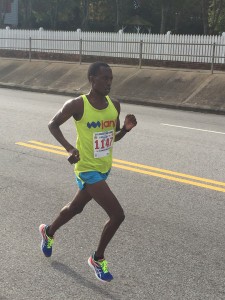
nonprofit organization that aims to do just that. This organization has been a dream of Ndhlovu’s since he arrived in the U.S.
Many athletes don’t get to reach their full potential because they don’t have the money or the grades. Ndhlovu wants to help student athletes who come from similar backgrounds get opportunities to attend college in the U.S. It’s a cause he understands all too well.
“Running opened a lot of doors for me and provided a means for me to pursue my academic goals,” he said. “I realize that it’s not about talent, but how hard one is willing to work to change their situation. Surviving blisters, running barefoot, taking the SATs five times. It’s all determination and heart.”
More than anything, he hopes his determination will pay off – if not for himself, then for others.
Ndhlovu believes running in Rio will open more doors for him. He says he is prepared for Houston and ready to take on the competition in Rio.
After Rio, you’ll find Ndhlovu back at home, in Augusta, coaching students. If you’re looking, you’ll probably see him on the canal. He’ll be the only blur that smiles, racing the morning sun.
 Augusta University
Augusta University
